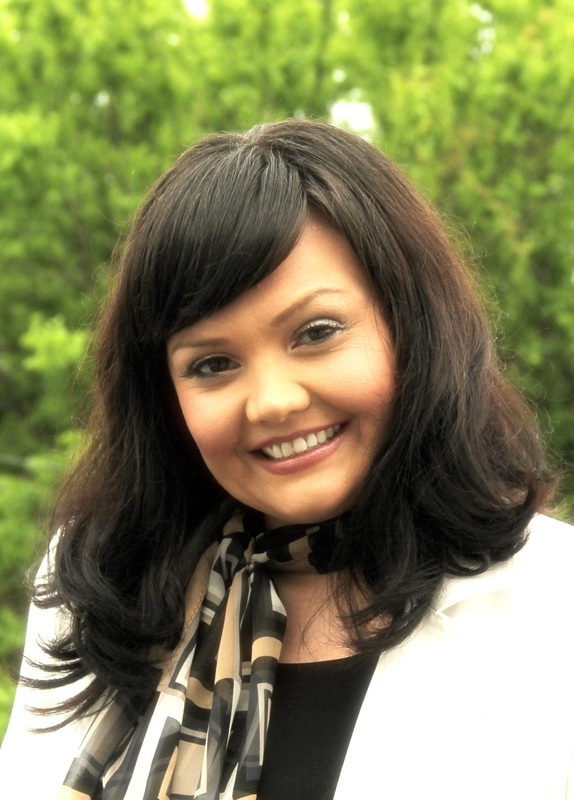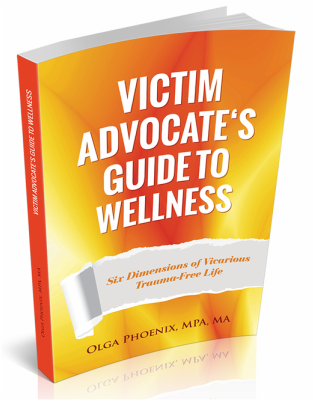|
12/6/2014 Preventing Vicarious Trauma By Olga Phoenix, See the Triumph Guest Blogger
My name is Olga, and I am a Vicarious Trauma Survivor… Between 40%-85% of “helping professionals” develop vicarious trauma, compassion fatigue and high rates of traumatic symptoms (Mathieu, 2012). How do we become vicarious trauma statistics? Seven years ago, I was training new domestic violence advocates on the topic of "Domestic Violence and Children Who Witness It." In the middle of my training I called for an emergency break and asked my training partner to continue without me. I ran outside, nauseated, covered in cold sweat, my heart exploding out of my chest, and ready to pass out. I was experiencing a full blown panic attack as a result of the material I was training on. Back then, it didn't occur to me to connect my adverse reaction to the fact that I witnessed my father murdering my mother as a child. After that panic attack incident my family and friends urged me to leave the field, concerned about my mental and physical health, my nightmares, my growing isolation and withdrawal, and my lack of life outside of work. I stayed because I felt that I had to stay no matter what, for my mom. I felt like I owed her that, to be working towards domestic violence elimination daily. Seven year ago, I thought that I was a Wonder Woman and my past did not define me. I still think exactly the same, except now I know that in order to help someone else heal, I first have to heal my own personal wounds, and then continue practicing radical vicarious trauma prevention and wellness in order to maintain a life free of vicarious trauma while working in the trauma field. The majority of us come to trauma-related work for a reason, often having our personal untreated histories of trauma, which makes us vulnerable to vicarious traumatization. My supervisor suggested I try therapy. That was one of the best suggestions that I ever took, and it started my seven year journey to healing and wellness. After a while, I learned that I don't owe anything to anyone, including my mom. I do this work because it inspires, empowers, and moves me. I get to do this work because I feel like I am contributing to bettering of the world, and that makes me feel like a real Wonder Woman. But in order to get to work in the trauma field, I must take care of myself. I must put myself first, always, because doing this is not selfish, but brave and effective. Putting myself first keeps me healthy and balanced in all areas of my life, for me, for my family, and for my clients. As victim advocates (aka helping/trauma professionals) we tend to wrap our whole identity around our work, our partner, and/or our children, trying to please everyone. We are constantly reaching for perfection, and forgetting ourselves in the process. We often fall short of our unreachable expectations. Perfection is impossible. Perfection is really a myth, created to keep us forever dissatisfied, guilty, and ashamed of ourselves. We are always striving for more, better, faster, but keep coming up short. This cycle, which keeps us out of balance, prevents us from building healthy and full life. I must foster and nurture life outside of work. I need to know I am not just a “victim advocate.” I am a friend, a sister, a mother, a cousin, an auntie. I’m spiritual, vulnerable seeker of wisdom, and an ocean lover. I can be intellectual, connected with nature, goofy, and loud at times. Sometimes I just feel lazy and want to escape to Tahiti. I’m also a student, a writer, world traveler, and a lover, who is full of life and gratitude. I can be a compassionate self-forgiver who is sometimes very hard on herself, but I know that life is a journey, not a destination. It’s progress, not perfection that counts. There are myriad of facets of me, and this doesn’t even scratch the surface. I’m sure the same is true for you. Most of us, victim's advocates and other trauma professionals, love our jobs. We are often individuals who want to change the world, to eliminate human suffering, to make a difference in the lives of other people. And in our jobs, we can do it all! We are the Wonder Women and Wonder Men who create social change daily. We are also people who have real troubles with taking care of ourselves, who feel guilty about taking vacations, who only take a break when we are really sick, who expect perfection of ourselves. The results are tragic, really. We lose committed, dedicated, and deeply caring trauma professionals to vicarious trauma, compassion fatigue, and burnout. Like me, you may have wondered, how do I prevent vicarious trauma, compassion fatigue, and burnout from creeping into my life? How do I do this all as a victim advocate, often overworked, underpaid, emotionally, and physically drained? Fortunately, vicarious trauma is preventable. If you are interested in learning more about vicarious trauma prevention, my new book "Victim Advocate's Guide to Wellness: Six Dimensions of Vicarious Trauma-Free Life" could be of help. It is your personal guide to living healthy and content while thriving in a trauma-related field. This piece is adapted from "Victim Advocate's Guide to Wellness: Six Dimensions of Vicarious Trauma-Free Life" by Olga Phoenix. For more blogs, videos, webinars, and training dates please visit www.olgaphoenix.com. Olga Phoenix is a national speaker, trainer, and an advocate. She is a founder and president of Olga Phoenix Project: Healing for Social Change, an organization dedicated to foster vicarious trauma prevention among trauma professionals, and to promote accessible, culturally relevant, and trauma-informed responses to trauma survivors through keynotes, trainings, and webinars. Ms. Phoenix is a Department of Justice Office for Victims of Crime Training and Technical Assistance Center Expert Consultant and Trainer on trauma-informed services, underserved populations, and vicarious trauma prevention; a member of Training and Mentoring Team at National Partnership to End Interpersonal Violence; as well as a member and motivational speaker at Elite Speaker's Bureau, Inc. Her new book about self-care and vicarious trauma prevention "Victim Advocate's Guide to Wellness: Six Dimensions of Vicarious Trauma-Free Life" came out in September 2014 and is available in ebook and paperback on Amazon.com @ http://www.amazon.com/Olga-Phoenix/e/B00N9M6MDU/ref=sr_tc_2_0?qid=1414527624&sr=1-2-ent. Ms. Phoenix graduated with a Masters of Public Administration and Nonprofit Management from the University of South Florida, Masters of Arts in Women’s Studies from Florida Atlantic University, and is currently a Doctorate Candidate at California Institute of Integral Studies. Comments are closed.
|
Archives
July 2024
CategoriesAll About Intimate Partner Violence About Intimate Partner Violence Advocacy Ambassadors Children Churches College Campuses Cultural Issues Domestic Violence Awareness Month Financial Recovery How To Help A Friend Human Rights Human-rights Immigrants International Media Overcoming Past Abuse Overcoming-past-abuse Parenting Prevention Resources For Survivors Safe Relationships Following Abuse Schools Selfcare Self-care Sexual Assault Sexuality Social Justice Social-justice Stigma Supporting Survivors Survivor Quotes Survivor-quotes Survivor Stories Teen Dating Violence Trafficking Transformative-approaches |
Search by typing & pressing enter




 RSS Feed
RSS Feed